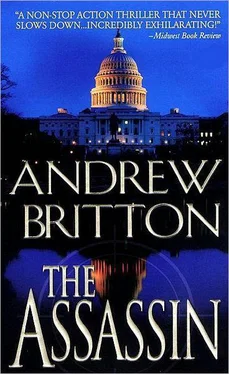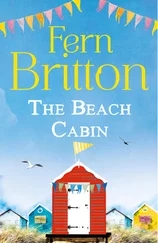Andrew Britton - The Assassin
Здесь есть возможность читать онлайн «Andrew Britton - The Assassin» весь текст электронной книги совершенно бесплатно (целиком полную версию без сокращений). В некоторых случаях можно слушать аудио, скачать через торрент в формате fb2 и присутствует краткое содержание. Жанр: Триллер, на английском языке. Описание произведения, (предисловие) а так же отзывы посетителей доступны на портале библиотеки ЛибКат.
- Название:The Assassin
- Автор:
- Жанр:
- Год:неизвестен
- ISBN:нет данных
- Рейтинг книги:3 / 5. Голосов: 1
-
Избранное:Добавить в избранное
- Отзывы:
-
Ваша оценка:
- 60
- 1
- 2
- 3
- 4
- 5
The Assassin: краткое содержание, описание и аннотация
Предлагаем к чтению аннотацию, описание, краткое содержание или предисловие (зависит от того, что написал сам автор книги «The Assassin»). Если вы не нашли необходимую информацию о книге — напишите в комментариях, мы постараемся отыскать её.
The Assassin — читать онлайн бесплатно полную книгу (весь текст) целиком
Ниже представлен текст книги, разбитый по страницам. Система сохранения места последней прочитанной страницы, позволяет с удобством читать онлайн бесплатно книгу «The Assassin», без необходимости каждый раз заново искать на чём Вы остановились. Поставьте закладку, и сможете в любой момент перейти на страницу, на которой закончили чтение.
Интервал:
Закладка:
First constructed in 1770 by William Fitzhugh, an American planter and delegate to the Continental Congress in 1779, the house was willed to Fitzhugh’s cousin by letter in 1825, along with 100 acres comprising the grounds. The property was then handed down through a succession of sons and daughters until 1976, when it was quietly purchased by an outside party: Richard Helms, the former director of Central Intelligence. Over the next few years, extensive modifications were made to the building’s interior. Then, in 1979, the government signed a fifty-year lease on the property. Although tax records indicated otherwise, Helms never received — nor requested — financial compensation of any kind. When Helms passed away in 2002, the property was willed to a like-minded, closemouthed supporter of the intelligence community, and everything continued as normal.
Since 1979, Windrush Manor had been a place for U.S. intelligence officers injured in the line of duty to convalesce, a place so secret that listing it with the Virginia Historical Society or a similar institution was no longer possible, for the property was no longer known to anyone who might conceive of doing so. Nestled deep within the Virginia Piedmont, Windrush was accessible only by a single service road. Wayward motorists occasionally found their way to the main gate, but when they did, they saw nothing that might give them cause for alarm, just a pair of watchful security guards, the kind of minimal protection often employed by wealthy, reclusive private citizens. The security was designed to be effective, but not obtrusive. The various electronic countermeasures scattered throughout the surrounding forest were just as efficient, and just as invisible. In short, Windrush was the kind of place that the U.S. government would never admit to knowing about, simply because it would never be forced to.
It was just after 1:00 PM when a black GMC Yukon rolled up to the service entrance just off US 421. The window came down with a whisper, and the driver produced his Agency credentials. The guards were not alarmed in the least, as this particular visitor was himself a recently discharged patient. He had left the manor two weeks earlier, but had visited every day since. Used to seeing his face, the guards would have preferred to let him pass without delay, but rules were rules. They called up to the small command post in the house, where another officer turned away from his microwaved lasagna and checked the list. Approval was given, and the driver was waved through.
The Yukon rose and fell over a series of gentle hills, the engine’s low rumble breaking the afternoon quiet, tires hissing on the damp, black ribbon road. The oak and hickory trees passing by were skeletal and absent of color, their bark stripped bare by foraging deer. After several miles the trees broke and the house appeared. The Yukon turned off the main road, the tires crunching on gravel as it rolled to a stop, the engine shutting off. Then the door swung open and Ryan Kealey stepped out, dressed in jeans, a black roll-neck sweater, and a corduroy barn jacket.
He took a moment to look around, breathing in the cold air, appraising the low gray clouds that scudded along the wintry sky. It was the first week of November, and a heavy snow had fallen two days earlier, freezing the millpond and blanketing the ground with a layer of clean white powder. The manor house, with its whitewashed fieldstone walls, almost looked like an extension of the ground, save for the wood shingle roof. Smoke curled out of the twin stone chimneys, the gray haze drifting east on a cold, steady breeze.
Kealey walked up the path to the banded oak door, aware of a black Suburban sitting off to his right. The engine was running, along with the heater, he guessed. He couldn’t see through the tinted windows, but as he moved forward, he shot a quick glance through the windshield. He was surprised to see a man he recognized. It was Harper’s longtime driver, apparently recovered from his bout with the flu. There didn’t appear to be anyone else in the vehicle, and looking around, he saw no sign of the other man. Kealey decided he was probably inside.
He knocked on the door and was admitted by Jean Everett, the head nurse. Everett was in her early forties, with blond hair going to gray and a kind, careworn face. She smiled at him and held out her arms for the flowers he was carrying. It had become a kind of daily ritual; she would accept the flowers he brought, find a vase and some water, then send him away with a gentle apology and a plea for a little more time. Kealey knew she did not bring the flowers upstairs until he was gone, as she didn’t want to give him the chance to explore the house. It was not a subtle gesture, but he couldn’t despise her for it; he knew she was just looking out for her patient.
“How is she?” he asked. It was another part of their ritual, and he received the expected response.
“Getting better. Healing.” She smiled again, but there was a trace of sadness there. He couldn’t be sure, but he thought this woman had lobbied on his behalf. “She’s eating a little bit more, which is a good thing. She went outside yesterday after you left, and I think that helped.”
“I’m glad,” Kealey said. There was the habitual awkward pause. “Will she see me?”
Everett shook her head sadly, just as she’d done every day for the past month. “She can’t, Ryan. She’s just not ready.”
Kealey looked away, struggling to hide his disappointment, but the nurse stepped close and put a comforting hand on his arm.
“It’ll happen. Just give her time.”
Kealey nodded. When he turned back, his face was set. “As much as she needs.”
A noise to his right caught his attention. He looked over, hope springing up, but it was just Jonathan Harper. He’d come out through the kitchen and was holding two steaming Styrofoam cups. He held one out and said, “I heard the gatehouse on the radio, so don’t start thinking I’m telepathic. I thought we might go for a walk.”
Kealey looked out the window. It was about to snow again, but that was fine; he needed the air. “Sure. Let’s go.”
They went out and turned right, crossing the grounds toward the pond, moving at a slow, deliberate pace. The gristmill was off to the right, the wooden walls covered in lichen, sagging with time and lack of maintenance. The waterwheel was half frozen in the surface of the pond. They crossed the narrow trestle bridge, heading for the gravel footpath on the other side.
“When did you get here?” Kealey finally asked.
“Just a few minutes before you did,” Harper replied. He hesitated, wondering what Kealey was thinking. It was the first time he had come to Windrush since the start of October, and he knew how that must look to the younger man. He hurried to change the subject.
“How’s the arm?”
Kealey looked down at his left arm, which was still in a white sling. “Not bad. They fixed it up pretty quick.”
“That’s bullshit, Ryan. I talked to the paramedics, as well as the doctors. I know you almost bled out on the way to the hospital, so don’t try to play it down.”
“Yeah, well…” Kealey looked away. “What happened to me was nothing, really. Not when you think about it.”
The unspoken thought seemed to cloud the air between them, but neither felt up to discussing it. They walked for a time, drinking their coffee, talking around the subject of Naomi. Most of what they went over had already cropped up over the past month, but so much had happened, it was helpful to go back and check the facts.
When the white Isuzu truck outside the Renaissance Hotel in Midtown Manhattan was finally opened by the NYPD’s Emergency Service Unit two hours after it tipped over, the contents generated an enormous amount of press coverage. Predictably, the news was followed by public outrage, and Will Vanderveen — even in death — quickly became the focus of an intense media storm. The former U.S. soldier was depicted as a psychopath and a terrorist-for-hire, but those were just two of the less-than-inventive titles bestowed upon him by Western media, none of which were complimentary.
Читать дальшеИнтервал:
Закладка:
Похожие книги на «The Assassin»
Представляем Вашему вниманию похожие книги на «The Assassin» списком для выбора. Мы отобрали схожую по названию и смыслу литературу в надежде предоставить читателям больше вариантов отыскать новые, интересные, ещё непрочитанные произведения.
Обсуждение, отзывы о книге «The Assassin» и просто собственные мнения читателей. Оставьте ваши комментарии, напишите, что Вы думаете о произведении, его смысле или главных героях. Укажите что конкретно понравилось, а что нет, и почему Вы так считаете.












